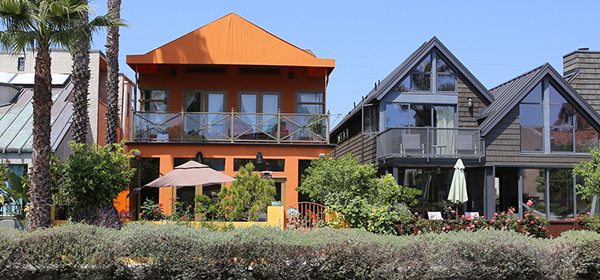Expat Tax - Selling US Property
Summary: Pressed to sell your U.S. abode? Don't overlook the benefits of partial section 121 exclusion.

You had become a property owner in an uptrend market, but in the meantime your job has all of a sudden vanished leaving you without a means to make mortgage payments. A new professional opportunity knocks on your door. However, the new career calls for a long-term posting to a frontier market. You compile a list of pros and cons; among other things, you take a close look at the potential rental income v. the mortgage and property tax cost (after income tax reduction benefit) ratio. Once you take into consideration property management fees, the outcome does not seem overtly appealing. You decide to sell the house and to arrive to the new country of residence flush with cash. However, you may be hitting a snag: you have owned the house for less than 2 years...
Section 121 capital gains exclusion is among the most generous features of the Internal Revenue Code as far the individual taxpayer is concerned. A person filing tax return as "single" can exclude up to $250,000 of capital gain on disposition of his or her primary residence; for couples filing jointly this exclusion amount is $500,000. Any gain in excess of the $250/500K threshold, however, may not be rolled over to the next purchase, i.e. it is taxed in the year of sale. There are a few things to be aware of in interpreting what may be and what may not be classified as you primary residence - that is beyond the scope of this article.
Section 121 calls for both, a two-year period of ownership and a two-year period of occupancy during the 5 years immediately preceding the sale. The two, however, do not have to be concurrent. For couples filing jointly, both parties have to satisfy the use test; only one has to meet the ownership requirement. The occupancy can be an aggregate of 730 days; it does not have to be a continuous period of 24 months. Furthermore, short absences, e.g. vacations or brief business trips, do not have to be subtracted from the periods of occupancy. Unlike the old once-in-a-lifetime exclusion, the current exclusion is reusable, providing there is a two-year hiatus between the transactions - "one-sale-in-two-years" requirement.
What if one does not meet the ownership and/or use test but is compelled to sell the abode due to some pressing circumstances? Would the capital gain (if any) be taxed in its entirety? It is noteworthy that there are situations when a potentially taxable gain might be far greater than one resulting from 1 to 2 years of rise in property's fair market value. Let us examine the following scenario:
Allison is a biotech research professional. Allison and her husband, Derek, resided at 2772 Walnut Drive from 9/18/2013 to 5/27/2015. Prior to June 20, 2014, Derek's father, Roger, owned the house. On June 20, 2014, Roger gifted the house to Derek. Roger purchased the house in 1982 for $175,000. After accounting for the cost of all improvements and the gift tax that Roger would have to pay upon the transfer, Roger's basis in the house on June 20, 2014, amounted to $250,000 (henceforth, these were Derek's basis in the house); the house's fair market value on that day was $520,000. In the spring of 2015, the company employing Allison announced a move of its research facility to South Africa. As during the recent years Derek could only find part-time employment, the couple decided to follow Allison's employer. In their absence, on November 15, 2015, their agent sold the house for a net amount of $545,000. Accordingly, Derek realized a capital gain of $295,000.
Based on the above, the couple fails both the use and the ownership section 121 test. Fortunately, the regulations, which are considered the U.S. Treasury Department's official interpretation of the tax code, provide for a partial fix to Derek and Allison's dilemma. Per 26 CFR 1.121-3(c)(1), among the criteria for determining whether someone qualifies for a partial section 121 capital gains exclusion is the test whether "A sale or exchange is by reason of a change in place of employment if, in the case of a qualified individual described in paragraph (f) of this section, the primary reason for the sale or exchange is a change in the location of the individual's employment."
Among other, cited in 26 CFR 1.121-3 relevant, determining factors is a determination whether "the taxpayer's financial ability to maintain the property is materially impaired," as well as whether "the circumstances giving rise to the sale or exchange are not reasonably foreseeable when the taxpayer begins using the property as the taxpayer's principal residence". Allison and Derek could most likely successfully argue the former if their combined income upon arrival to South Africa was substantially lower than before; invoking the latter would have to be based on Allison's ability to give compelling reasons as to why her employer's ultimate decision to move overseas could have been reasonably considered unforeseeable.
Returning to our example:
Derek and Allison would be most likely eligible for a partial capital gain exclusion. In order to determine the partial (fractional) exclusion amount, we would have to place in the numerator the shorter of the two periods, ownership or use. It this case, it would be the former (513 days). The denominator is 730, i.e. the number of days required for the full exclusion to apply. Therefore, the couple (or Derek filing separately) should be able to exclude $207,308 of the gain (513/730 * $295,000), but would have to pay capital gains tax on the remainder.
About the Author
Cezary Tchorznicki is a CPA in the State of New York. He specializes in tax services for expatriates (itax4expats.com), providing tax return preparation and tax planning for U.S. citizens and residents (green card holders) living abroad. Avoid unnecessary double taxation while preventing compliance related pitfalls.
First Published: Apr 20, 2016


